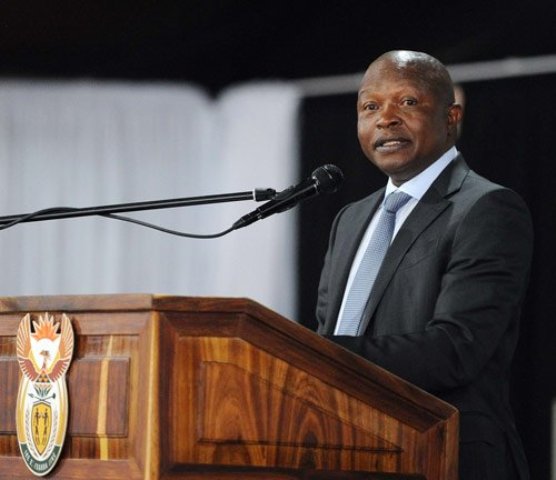Nation Mourns David Mabuza as Former Deputy President to Receive State Funeral
“On behalf of the collective institution of traditional and Khoi-San leadership, the House expresses its deep sorrow at the loss of former Deputy President Mabuza,” said Seatlholo.

- Country:
- South Africa
South Africa is in mourning following the passing of former Deputy President David Dabede Mabuza, a figure whose decades-long public service has left an enduring imprint on the country’s political and traditional landscapes. Mabuza, who died on Thursday, 3 July 2025, after a short illness, was 64.
In recognition of his national stature and contributions to governance, President Cyril Ramaphosa has declared a State Funeral Category 2, scheduled for Saturday, 12 July, in his hometown in Mpumalanga. Accompanying this solemn farewell will be a period of National Mourning from Monday, 7 July to Saturday evening, marked by official remembrance and flags flown at half-mast.
Traditional Leadership Pays Tribute
Among those leading the tributes is the National House of Traditional and Khoi-San Leaders (NHTKL). In a heartfelt message, NHTKL chairperson Kgosi Thabo Seatlholo expressed the collective grief of traditional communities across the country.
“On behalf of the collective institution of traditional and Khoi-San leadership, the House expresses its deep sorrow at the loss of former Deputy President Mabuza,” said Seatlholo. “We extend our heartfelt condolences to Mrs Mabuza, the children, and the people of Mpumalanga during this time of grief.”
The House highlighted Mabuza’s close and constructive relationship with traditional leaders, notably during his tenure as Chairperson of the Inter-Ministerial Task Team on Traditional Leadership, a platform dedicated to addressing the pressing developmental and governance issues within traditional communities.
A Lifelong Commitment to Traditional Affairs
Mabuza's political legacy was deeply intertwined with the empowerment of traditional leadership. From his early political career as MEC for Agriculture to his role as Premier of Mpumalanga, and later as Deputy President of the Republic, Mabuza consistently engaged with traditional leaders across provinces.
The NHTKL noted that Mabuza was a strong advocate for cooperation between traditional structures and the democratic state. “He promoted meaningful dialogue, collaboration, and mutual respect, leaving a lasting legacy of unity and cooperation,” said the House.
His efforts contributed to a more structured and consultative approach to dealing with matters affecting traditional leadership, land use, rural development, and cultural preservation.
State Funeral Category 2: A National Honour
President Ramaphosa’s announcement of a State Funeral Category 2 underscores the national importance of Mabuza’s role. According to the State, Official, and Provincial Official Funeral Policy Manual, this category is reserved for a Deputy President, Acting President, or former Deputy Presidents.
As such, the funeral will feature full military ceremonial honours and will be attended by dignitaries, government officials, and members of the diplomatic corps.
Ramaphosa also emphasized the importance of national reflection during the mourning period. “David Mabuza served this nation with dedication and integrity. He was a unifier, a listener, and a public servant deeply committed to rural development and traditional leadership,” the President stated.
Final Resting Place: Mpumalanga
The late former Deputy President will be laid to rest in his hometown in Mpumalanga, a province where he built his political career and maintained strong roots. Known affectionately as “The Cat” for his perceived political agility and survival instincts, Mabuza played a pivotal role in shaping the post-apartheid political landscape.
His death marks the end of an era for many rural communities that saw him as both a political leader and a custodian of cultural dialogue between traditional and modern governance systems.
A Lasting Legacy
Beyond politics, Mabuza will be remembered for his behind-the-scenes diplomacy, his efforts to foster peace within the ruling party, and his focus on ensuring that the concerns of rural and traditional communities were heard at the highest levels of government.
While his legacy is complex, Mabuza’s commitment to traditional institutions, community development, and national reconciliation remain a significant part of his public persona.
As the country prepares to bid farewell to a prominent leader, the collective grief from institutions like the NHTKL serves as a poignant reminder of the broad impact David Mabuza had on South African society.










